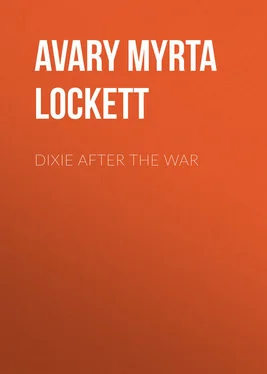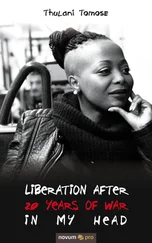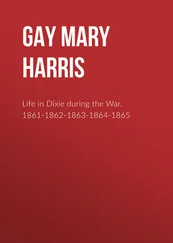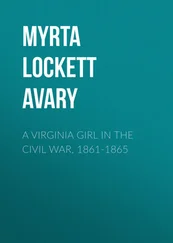Myrta Avary - Dixie After the War
Здесь есть возможность читать онлайн «Myrta Avary - Dixie After the War» — ознакомительный отрывок электронной книги совершенно бесплатно, а после прочтения отрывка купить полную версию. В некоторых случаях можно слушать аудио, скачать через торрент в формате fb2 и присутствует краткое содержание. ISBN: , Жанр: foreign_antique, foreign_prose, Историческая проза, на английском языке. Описание произведения, (предисловие) а так же отзывы посетителей доступны на портале библиотеки ЛибКат.
- Название:Dixie After the War
- Автор:
- Жанр:
- Год:неизвестен
- ISBN:http://www.gutenberg.org/ebooks/41730
- Рейтинг книги:5 / 5. Голосов: 1
-
Избранное:Добавить в избранное
- Отзывы:
-
Ваша оценка:
- 100
- 1
- 2
- 3
- 4
- 5
Dixie After the War: краткое содержание, описание и аннотация
Предлагаем к чтению аннотацию, описание, краткое содержание или предисловие (зависит от того, что написал сам автор книги «Dixie After the War»). Если вы не нашли необходимую информацию о книге — напишите в комментариях, мы постараемся отыскать её.
Dixie After the War — читать онлайн ознакомительный отрывок
Ниже представлен текст книги, разбитый по страницам. Система сохранения места последней прочитанной страницы, позволяет с удобством читать онлайн бесплатно книгу «Dixie After the War», без необходимости каждый раз заново искать на чём Вы остановились. Поставьте закладку, и сможете в любой момент перейти на страницу, на которой закончили чтение.
Интервал:
Закладка:
I wonder how many men now living remember certain loaves of wheaten bread which the women of Richmond collected with difficulty in the last days of the war and sent to Miss Emily V. Mason, our “Florence Nightingale,” for our own boys. “Boys,” Miss Emily announced – sick soldiers, if graybeards, were “boys” to “Cap’n,” as they all called Miss Emily – “I have some flour-bread which the ladies of Richmond have sent you.” Cheers, and other expressions of thankfulness. “The poor, sick Yankees,” Miss Emily went on falteringly – uneasy countenances in the ward – “ can’t eat corn-bread – ” “Give the flour-bread to the poor, sick Yankees, Cap’n!” came in cheerful, if quavering chorus from the cots. “ We can eat corn-bread. Gruel is good for us. We like mush. Oughtn’t to have flour-bread nohow.” “Poor fellows!” “Cap’n” said proudly of their self-denial, “they were tired to death of corn-bread in all forms, and it was not good for them, for nearly all had intestinal disorders.”
Along with this corn-bread story, I recall how Dr. Minnegerode, Protestant, and Bishop Magill, Catholic, used to meet each other on the street, and the one would say: “Doctor, lend me a dollar for a sick Yankee.” And the other: “Bishop, I was about to ask you for a dollar for a sick Yankee.” And how Annie E. Johns, of North Carolina, said she had seen Confederate soldiers take provisions from their own haversacks and give them to Federal prisoners en route to Salisbury. As matron, she served in hospitals for the sick and wounded of both armies. She said: “When I was in a hospital for Federals, I felt as if these men would defend me as promptly as our own.”
In spite of the pillage, vandalism and violence they suffered, Southern women were not so biassed as to think that the gentle and brave could be found only among the wearers of the gray. Even in Sherman’s Army were the gentle and brave upon whom fell obloquy due the “bummers” only. I have heard many stories like that of the boyish guard who, tramping on his beat around a house he was detailed to protect, asked of a young mother: “Why does your baby cry so?” She lifted her pale face, saying: “My baby is hungry. I have had no food – and so – I have no nourishment for him.” Tears sprang into his eyes, and he said: “I will be relieved soon; I will draw my rations and bring them to you.” He brought her his hands full of all good things he could find – sugar, tea, and coffee. And like that of two young Philadelphians who left grateful hearts behind them along the line of Sherman’s march because they made a business of seeing how many women and children they could relieve and protect. In Columbia, during the burning, men in blue sought to stay ravages wrought by other men in blue. I hate to say hard things of men in blue, and I must say all the good things I can; because many were unworthy to wear the blue, many who were worthy have carried reproach.
On that morning of the occupation, our women sat behind closed windows, unable to consider the new path stretching before them. The way seemed to end at a wall. Could they have looked over and seen what lay ahead, they would have lost what little heart of hope they had; could vision have extended far enough, they might have won it back; they would have beheld some things unbelievable. For instance, they would have seen the little boy who played with the buttons and tassels, grown to manhood and wearing the uniform of an officer of the United States; they would have seen Southern men walking the streets of Richmond and other Southern cities with “U. S. A.” on their haversacks; and Southern men and Northern men fighting side by side in Cuba and the Philippines, and answering alike to the name, “Yankees.”
On the day of the occupation, Miss Mason and Mrs. Rhett went out to meet General Weitzel and stated that Mrs. Lee was an invalid, unable to walk, and that her house, like that of General Chilton and others, was in danger of fire. “What!” he exclaimed, “Mrs. Lee in danger? General Fitz Lee’s mother, who nursed me so tenderly when I was sick at West Point! What can I do for her? Command me!” “We mean Mrs. Robert E. Lee,” they said. “We want ambulances to move Mrs. Lee and other invalids and children to places of safety.” Using his knee as a writing-table, he wrote an order for five ambulances; and the ladies rode off. Miss Emily’s driver became suddenly and mysteriously tipsy and she had to put an arm around him and back up the vehicle herself to General Chilton’s door, where his children, her nieces, were waiting, their dollies close clasped.
“Come along, Virginia aristocracy!” hiccoughed the befuddled Jehu. “I won’t bite you! Come along, Virginia aristocracy!”
A passing officer came to the rescue, and the party were soon safely housed in the beautiful Rutherford home.
The Federals filled Libby Prison with Confederates, many of whom were paroled prisoners found in the city. Distressed women surrounded the prison, begging to know if loved ones were there; others plead to take food inside. Some called, while watching windows: “Let down your tin cup and I will put something in it.” Others cried: “Is my husband in there? O, William, answer me if you are!” “Is my son, Johnny, here?” “O, please somebody tell me if my boy is in the prison!” Miss Emily passed quietly through the crowd, her hospital reputation securing admission to the prison; she was able to render much relief to those within, and to subdue the anxiety of those without.
“Heigho, Johnny Reb! in there now where we used to be!” yelled one Yankee complacently. “Been in there myself. D – d sorry for you, Johnnies!” called up another.
A serio-comic incident of the grim period reveals the small boy in an attitude different from that of him who was dandled on the Federal knee. Some tiny lads mounted guard on the steps of a house opposite Military Headquarters, and, being intensely “rebel” and having no other means of expressing defiance to invaders, made faces at the distinguished occupants of the establishment across the way. General Patrick, Provost-Marshal General, sent a courteously worded note to their father, calling his attention to these juvenile demonstrations. He explained that while he was not personally disturbed by the exhibition, members of his staff were, and that the children might get into trouble. The proper guardians of the wee insurgents, acting upon this information, their first of the battery unlimbered on their door-step, saw that the artillery was retired in good order, and peace and normal countenances reigned over the scene of the late engagements.
I open a desultory diary Matoaca kept, and read:
“If the United States flag were my flag – if I loved it – I would not try to make people pass under it who do not want to. I would not let them. It is natural that we should go out of our way to avoid walking under it, a banner that has brought us so much pain and woe and want – that has desolated our whole land.
“Some Yankees stretched a flag on a cord from tree to tree across the way our children had to come into Richmond. The children saw it and cried out; and the driver was instructed to go another way. A Federal soldier standing near – a guard, sentinel or picket – ordered the driver to turn back and drive under that flag. He obeyed, and the children were weeping and wailing as the carriage rolled under it.”
In Raymond, Mississippi, negro troops strung a flag across the street and drove the white children under it. In Atlanta, two society belles were arrested because they made a detour rather than walk under the flag. Such desecration of the symbol of liberty and union was committed in many places by those in power.
Читать дальшеИнтервал:
Закладка:
Похожие книги на «Dixie After the War»
Представляем Вашему вниманию похожие книги на «Dixie After the War» списком для выбора. Мы отобрали схожую по названию и смыслу литературу в надежде предоставить читателям больше вариантов отыскать новые, интересные, ещё непрочитанные произведения.
Обсуждение, отзывы о книге «Dixie After the War» и просто собственные мнения читателей. Оставьте ваши комментарии, напишите, что Вы думаете о произведении, его смысле или главных героях. Укажите что конкретно понравилось, а что нет, и почему Вы так считаете.












